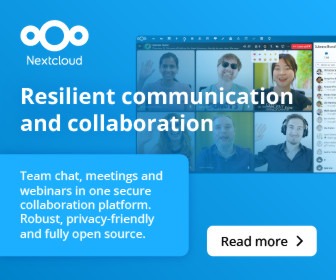Most of us come to GNU/Linux and FOSS for reasons other than the GPL. Some, perhaps, first installed Linux only as a way of tinkering or just to have a look at a PC running something other than Windows. Others, maybe, grew tired of Microsoft or constantly dealing with the “blue screen of death.” The need to breathe new life into a computer that had grown obsolete by Redmond’s standards brought others to discover Linux. Then there are those who came for the free beer.
Not everybody who tries open source stays. More than a few have taken a look at a Linux distro, maybe something purchased shrink wrapped in a box at the Best Buy store or from a CD found in the back of a computer magazine, and threw their hands-up because of a learning curve (however slight it may be) and went running back to the comfort zone of Windows.
Those who stay, who take Tux for a test spin and decide to keep him, usually end up developing a deep respect for the GPL. There are probably as many reasons for this as there are reasons why we tried Linux and free software to begin with.
To some the GPL is merely a really cool model for developing software. It’s a way for many people, or many organizations, with a shared need or interest to develop software by spreading-out the cost through shared ownership of a product. Although that could also be accomplished with proprietary software, the open source license allows the use of different parts of the code in different applications, which might not be easily done under the proprietary model.
To many in this group, the difference between “copyleft” licenses such as the GPL and “permissive” open source licenses are minimal. They note the differences, and take great pains to choose a license that suits their needs, but there is no great philosophical rift between the notion of free software (FOSS) licenses and other open source software (OSS) licenses. Nor do they see the irony in the fact that “permissive” licenses may end-up producing restricted, proprietary software, such as how Apple’s closed OS X is partially built on code freely obtained from FreeBSD and NetBSD.

| [yop_poll id=”19″] |
This group, too, doesn’t necessarily see much of a philosophical distinction between copyleft and permissive licenses. Some Creative Commons licenses, for example, allow for a work such as an essay or photograph to be used free for noncommercial purposes but not for commercial use, which might require a fee. Although similar in nature, this is a little different than dual licensing schemes involving the GPL.
For many people, the ideas represented by the GPL and the Free Software Foundation go deeper than copyrights and even economics. Many see the ideas expressed by FOSS advocates as actually representing a somewhat spiritual world view of sharing and joint ownership being codified and specifically applied to computer software.
To this group of people, there is an obvious distinction between copyleft licenses such as the GPL and more permissive but still open source licenses such as BSD or Apache. Perhaps the only reason this group finds the later licenses acceptable is because any code released under a permissive license is also available for release under the GPL.
What’s your take on the GPL?
Is it merely just another way of doing business in the software world? Does it indicate a total world view in the disguise of a software license? Or does it fall somewhere in-between? Maybe you’re one of those who agrees with Steve Ballmer, who once sowed FUD by trying to spread the sentiment that the GPL was, by nature, communist? Perhaps you don’t care, as long as you get to use free software?
We’d like to know what you think. Take our poll. And if you want to say more than can be said by ticking-off answers, feel free to leave a comment below.






Your poll is seriously deficient. None of the provided choices comes anywhere close to what I think about the GPL.
I switched to Linux on the desktop to escape from the clutches of Microsoft, and I stayed with GPL software because of the relationship between developers and me created by the license. It has nothing to do with business, philosophy, or communism.
Decades ago, Burlington Coat Factory had a policy of confiscating shopper’s bags at the door on the way into their stores and would only let customers leave by way of the cash register. The message was clear: I was a presumed thief, and I was expected to buy my way out the door. Microsoft’s policies are not all that different. One does not need to become a communist or adopt a deep philosophy to dislike such treatment enough to leave.
GPL is the perfect license for software that enters the world as open source and is intended to remain open source indefinitely. I have spent the last two and a half decades maintaining a major software package that we released under the GPL and have not regretted it.
On the other hand, Richard Stallman needs to be put out to pasture. He was a brilliant developer, but nowadays he just spends all of his time whining. Ain’t nobody got time for that!
In my minds eye the GPL is sth. in between communism and rape. More importantly though the GPL is the #1 reason for people, particularly business people, to mistrust or rightout reject OS software.
Trying to introduce OS software at companies I’ve heard diverse concerns (like “are those amateurs qualified?”) but GPL was the killer in each and every case.
And frankly, I’d have a hard time to oppose those who consider the GPL a virus or worse.
I don’t think it is dangerous … but then I am a real Communist. ::grin::
@alois
Considering your own attitude about the GPL (communism, rape, etc.), it’s no wonder your “introductions” of it were rejected.
Free software is about freedom, communism is not.
In the soviet union everything that you’d use in your day to day life was state property, with proprietary software all the software you use is company property.
A more realistic comparison would be: proprietary software is communism (or rather: state capitalism following te stalinist model).
A basic principle states that one person’s freedom ends where another person’s freedom begins.
The only type of license that guarantees this is a copyleft license.
The GPL is about freedom, as RMS repeatedly tells us. He got it right then and he has it right now, in spite of the tendency of some people to mock a man who lives by his principles. The GPL is about principles, which is what makes it abhorrent to some. That’s who the more permissive licenses are for. The ones who squirm when it looks too hard.
The GPL is what has guaranteed software freedom, and I’m all for it. It is the result of a philosophy that sharing is to be encouraged if you so choose, not hindered. If you don’t like that, then you’re free to not use GPL’d software and either roll your own or purchase it from the likes of Microsoft and Apple. However, if like me, you prefer actual freedom, you can also purchase your software from companies like Red Hat, Fixstars, Sourcefire, etc. I prefer the latter.
–SYG
As a professional software developer working with proprietary software I came to the realization long ago that there’s a fundamental difference between the digital world and the more physical world.
Software is a tool which is hard and expensive to make but can then be reproduced and distributed at near zero cost unlike traditional tools. Software can be more varied and more easily adapted than physical goods too.
What ‘open source’ (GPL, BSD, etc.) does is shift the balance from the maker to the user. This fits the nature of software as digital entities better than products which are finished the moment they leave the factory.
Same goes for other bytes, software isn’t fundamentally different from, say, mp3s. IMHO, traditional copyright regulations don’t work in the digital domain; you can’t give the exclusivity for reproduction and publication to the maker anymore, you can’t offer effective protection to a rightsholder.
However, this is a bit troubling for GPL as it’s a license that works on copyright, unlike for example the BSD licenses.
I agree with the freedom argument. The GPL is about protecting the freedom of the consumer, not the programmer.
@Caesar Tjalbo
The GPL does not use copyright to protect digital bits, such as mp3 files. The compiled version of a GPL program may be restricted in any way that an mp3 file can be, except that it’s source code must be made available to consumers of the digital product. It protects the source code for compilable software, which may be published in print form as easily as it can be published in digital formats. The distinction between its use of copyright and that of traditional publishers is that it uses copyright to guarantee the rights of consumers, rather than restricting those rights. It is only problematic to those who want to retain all the advantages afforded by copyright and who want to treat digital bits like real-world objects with unit pricing.
The GPL is a viral copyleft (software donation) license by design; vs the BSD permissive that allows proprietary takeover. It’s not a business model, it’s a donation model. This extreme is appropriate for a few rare cases.
Proprietary licensing, the opposite extreme, is just as rarely appropriate.
Few businesses thrive under compulsory donation; few societies thrive under monopoly slavery: neither extreme is healthy.
There is a huge market opportunity for a platform between these extremes. Robust, dynamic, self-regulating, decentralized – these descriptors await some licensing pioneering genius.
To me, the difference between (say) BSD and GPL is much like that between a society where you are free to do anything and a society where you are free to do anything, except to take away the freedom of the others. The first sounds better, but the second achieves better.
Excellent analogy, Grigor. You’ve taken a concept that can be puzzling and made it simple. Thank you.
rjb
I agree. Not only does Grigor’s analogy “make it simple,” it’s thought provoking at the same time. And like the GPL itself, it can be applied to all areas of life as well.
I am really grateful for the people who contribute here on this site!